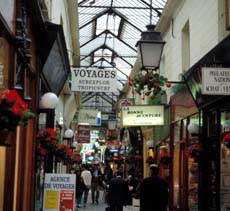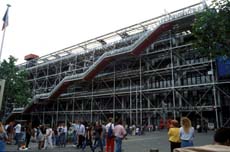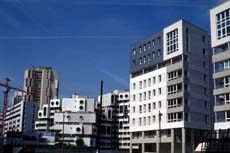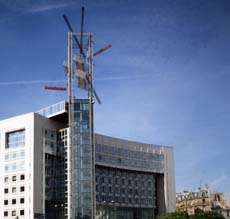A problem from Walter Benjamin

One of the Passages in Paris studied by Walter Benjamin

Architecture influencing people by being a background: the Centre Pompidou, Paris

Architecture influencing by being a background: apartments in Paris

Focal attention, Paris
In his essay on "The Work of Art in the Age of Mechanical Reproduction, " Walter Benjamin observed that
"Architecture has always represented the prototype of a work of art the reception of which is consummated by a collectivity in a state of distraction. . . . Architecture [is] appropriated in a twofold manner: by use and by perception, or rather, by touch and sight. Such appropriation cannot be understood in terms of the attentive concentration of a tourist before a famous building . . . [Buildings are appropriated] not so much by attention as by habit."Benjamin 1968
Benjamin was concerned with buildings, but places too are appropriated in a state of distraction. The expectations and norms of places influence us, but we do not normally focus on those norms. We act in accord with them; we navigate within the landscape of possibilities they create. We concentrate not on that landscape but on the goals and objects we see across it. Does this mean, then, that when I urge more complex places, I am demanding in vain that places should no longer be lived in a state of distraction?
Imagine that we increase the complexity of a simplified place -- we find ways to make visible the many different linkages to other places, the multiple ways the place fits into people's lives, making visible too the processes on which the place depends. All these new links and complexities will be obvious for a while, but then won't they fade into the background? The place will experienced in a state of distraction. This would seem to mean that lived complexity a temporary condition.
However, the objection makes the mistake of presuming that complexity must be experienced as the central focus of awareness. Places are landscapes of possibility that are experienced as opening out into futures or and sets of presences and absences that surround what is focally present. This "awareness" is not focal; it is the kind of awareness that we have about what one does with a doorknob or how one behaves in a parliament building. An increase of lived complexity does not demand a focal second awareness, but rather an enrichment in the background that changes the sense of focal objects and activities.
- [Return to "strategies"]
- [Nearby: Complexity outline -- Dense versus diluted places -- Complexity as a value ]